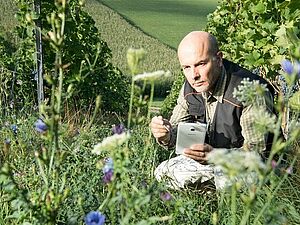"We must prevent a regression into the past"
Voices on biodiversity
Lukas Pfiffner holds a doctorate in agroecology and has been researching biodiversity in agriculture at FiBL Switzerland for over 30 years. He is particularly interested in how different farming methods affect biodiversity locally and at the landscape level, with a focus on important organisms such as beneficial insects, pollinators and earthworms.
The political atmosphere in Switzerland in support of biodiversity is currently not very favourable – what is going wrong?
Lukas Pfiffner: A lot of things are going wrong, especially in the perception of what biodiversity can achieve. We are seeing a regression to the time before 1990. Many people are once again in favour of a purely profit-oriented approach instead of a systems-based strategy for multifunctional agriculture, as required by the Federal Constitution. This is hindering the urgently needed transformation towards resource-conserving and resilient farming.
Why has this regression occurred?
There are various reasons: In the short term, the coronavirus situation, inflation, product shortages due to supply chain problems and the war in Ukraine have significantly changed conditions on the ground. In response, certain circles are resorting to simple, quick and frankly bogus solutions to preserve the status quo. The big picture is often lost in the political process. Promoting biodiversity is not just about biodiversity and nature conservation, but about developing a modern, productive cultivation system that produces healthy, unpolluted food and causes as little collateral damage to the environment and humans as possible.
With the minimum 3.5 percent biodiversity promotion areas, or BPA for short, in arable land, Switzerland would have had a tool to improve the situation. Parliament has now rejected the mandatory requirement. Is the biodiversity lobby too weak?
Certainly! Biodiversity, landscape and nature conservation have hardly any political influence. Environmental concerns are often seen as special interests. But they are not. They have a significant influence on each individual and are important for general welfare. The unsuccessful implementation of the 3.5 percent BPA is a disaster that weakens trust in the authorities and boosts those circles who claim that we do not have a biodiversity crisis. This is a reckless decision and demonstrates a disregard for the facts. There are multiple studies that prove a mass extinction of various ecosystem-relevant organisms. For example: insect biomass in Germany has fallen by 95 per cent in the last 24 years. As a result, there is far too little functioning biodiversity, which weakens key ecosystem services and reduces productivity.
How big is agriculture's share of the crisis?
Agriculture accounts for a very large proportion of local environmental pollution. We know that in the 1970s, the intensity of cultivation in arable farming, speciality crops and grassland increased significantly. Extensive collateral damage, especially to soil and water, has occurred but was ignored for a long time. Today we are moving in a similar direction – backwards – in some cases. Too little attention is being paid to the consequences of the long-term use of products such as pesticides and fertilisers. These consequences include damage to ecosystem services, pollution of water bodies, forests and nature conservation areas, and increasingly unstable and less resilient cultivation systems. Although BPA in agriculture are a positive factor, they cannot compensate for the loss. Water bodies are particularly affected, with considerable cost implications for the treatment of drinking water and groundwater.
Is the biodiversity initiative that we will be voting on in Switzerland in September overloaded? After all, it not only calls for greater promotion of biodiversity, but also wants to restrict construction activity?
That may be the case. But the basic problem is the conservative opponents of the agro-ecological transformation of agriculture. They oppose any improvement to the system. An expansion of ecological direct payments, primarily for the remuneration of public services, is sensible and forward-looking. This also includes an adaptation of the ÖLN (ÖLN = proof of ecological performance, minimum standard for Swiss agriculture, editor's note) with additional, clear quality requirements.
Are organic farmers sufficiently sensitised to biodiversity?
I hope that it is only a small minority of organic farmers who do not yet understand that whole-farm biodiversity is just as important on a production basis for organic farming as soil fertility. I also see the problem of land, i.e. the competition between production and BPA, but maintain that functional biodiversity belongs in the system. It can significantly support production via ecological functions and improve resilience. This is particularly important for organic farms because they have fewer inputs available and use less of them.
What can FiBL do to wake up politicians and society?
We need to communicate more widely about the critical role biodiversity plays in the ecosystem, how that relates to organic farming, and the collateral damage caused by its reduction. This should also be discussed with key players in the landscape. We need to take a broader view of our agricultural and food system, and identify the effects on natural resources. Organic farming is part of the solution here and can contribute a great deal. It remains crucial to provide the public media with our information and facts.
Interview: Adrian Krebs, FiBL
Further information
Contact
Select publications with contributions by Lukas Pfiffner
- fibl.org: Podcast FiBL Focus: "Was Landwirtschaft mit Biodiversität zu tun hat" (in German)
- fibl.org: Factsheet "Organic Agriculture and Biodiversity: Impacts of different farming systems on biodiversity"
- fibl.org: Technical guide "Wildbienen fördern – Erträge und Pflanzenvielfalt sichern" (in German and French)




